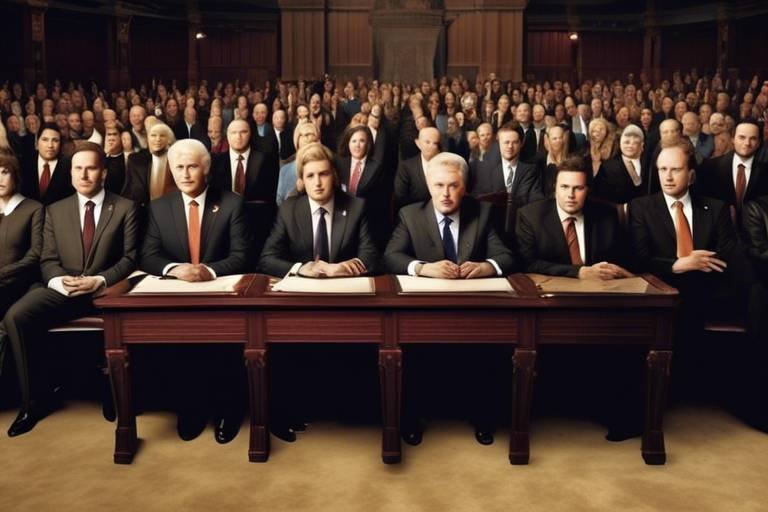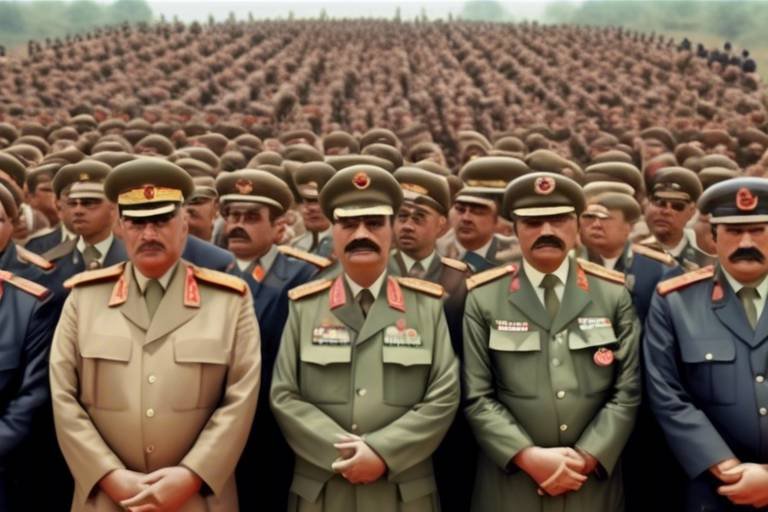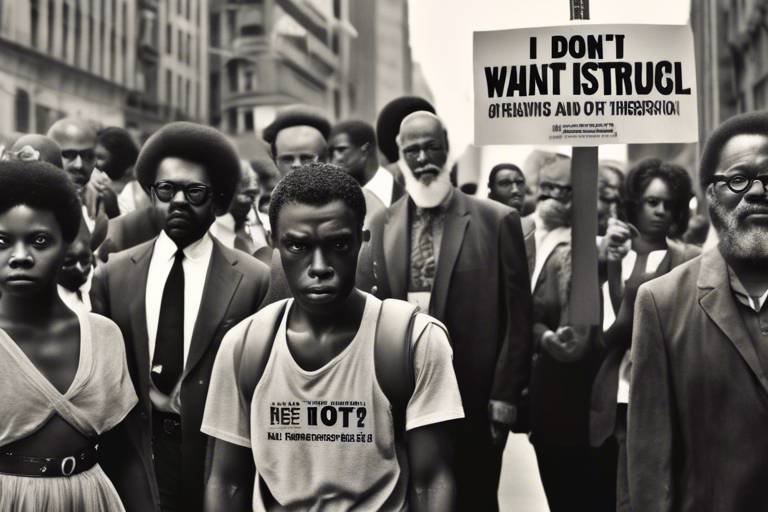Philosophy of Sustainable Development and its Political Relevance
The concept of sustainable development has emerged as a beacon of hope in an era marked by environmental degradation, social inequality, and economic instability. But what does it truly mean? At its core, sustainable development is about finding that delicate balance between meeting our current needs without compromising the ability of future generations to meet theirs. It’s a philosophy that intertwines environmental stewardship with social equity and economic viability, creating a holistic approach to progress. This article delves into the philosophical foundations of sustainable development, shedding light on its political significance and the implications it holds for policymakers and global governance.
To understand the political relevance of sustainable development, we must first explore its theoretical underpinnings. Various philosophical frameworks, such as utilitarianism, deep ecology, and social justice, contribute to our understanding of sustainability. Utilitarianism focuses on maximizing overall happiness, prompting us to consider the greatest good for the greatest number. Deep ecology, on the other hand, advocates for intrinsic value in all living beings, urging us to rethink our relationship with nature. Meanwhile, social justice emphasizes equity, ensuring that the benefits and burdens of development are shared fairly among all communities.
As we navigate the complexities of sustainable development, it's essential to recognize its historical evolution. From the early environmental movements of the 1960s and 70s, which raised awareness about pollution and conservation, to the landmark Brundtland Report in 1987, which coined the term "sustainable development," the concept has gained traction over the decades. More recently, the establishment of the Sustainable Development Goals (SDGs) by the United Nations in 2015 has set a global agenda that aims to eradicate poverty, protect the planet, and ensure prosperity for all by 2030.
Examining the key philosophical theories that inform sustainable development reveals a rich tapestry of ideas that shape our understanding of sustainability in practice. For instance, utilitarianism encourages us to evaluate policies based on their outcomes, pushing for solutions that benefit the majority. Deep ecology challenges the anthropocentric view, advocating for a more profound respect for nature and all its inhabitants. Social justice, in this context, demands that we address the disparities in resource distribution, ensuring that marginalized communities have a voice in the sustainability discourse.
Now, let’s pivot to the political implications of sustainable development. The principles of sustainability intersect with various political ideologies, influencing governance structures and policy-making processes. Governments play a crucial role in promoting sustainable development through regulatory measures, public investment, and the creation of policy frameworks that foster innovation and collaboration. However, challenges abound. Political resistance, economic constraints, and the necessity for multi-stakeholder collaboration can hinder the effective implementation of sustainable policies.
In conclusion, the philosophy of sustainable development is not just an academic concept; it is a vital framework that informs our political landscape. As we grapple with pressing environmental and social challenges, understanding this philosophy becomes imperative for fostering a more equitable and sustainable future. The political relevance of sustainable development cannot be overstated, as it shapes the decisions that affect our planet and its inhabitants. By embracing these principles, we can work towards a world where development meets the needs of all, both now and in the future.
- What is sustainable development? Sustainable development is a holistic approach that seeks to meet the needs of the present without compromising the ability of future generations to meet their own needs.
- Why is sustainable development politically relevant? It influences policy-making, governance structures, and the intersection of environmental, social, and economic issues, shaping the future of our planet.
- What are the key philosophical theories behind sustainable development? Key theories include utilitarianism, deep ecology, and social justice, each contributing unique perspectives on sustainability.

Theoretical Foundations of Sustainable Development
The philosophy of sustainable development is a rich tapestry woven from various theoretical threads that reflect our evolving understanding of humanity's relationship with the environment. At its core, sustainable development seeks to balance economic growth, environmental stewardship, and social equity. This balancing act is not just a political or economic necessity; it is a profound ethical challenge that draws upon several philosophical frameworks.
One of the most influential theories in this realm is utilitarianism. Rooted in the works of philosophers like Jeremy Bentham and John Stuart Mill, utilitarianism posits that the best action is the one that maximizes utility, defined as the greatest happiness for the greatest number. In the context of sustainable development, this perspective encourages policies and practices that enhance overall well-being while minimizing harm to the environment. However, critics argue that utilitarianism can overlook the needs of marginalized communities, raising questions about whose happiness is prioritized in decision-making processes.
Another significant philosophical foundation is deep ecology, which advocates for an intrinsic value in all living beings and ecosystems, regardless of their utility to human beings. This perspective challenges anthropocentric views that place humans at the center of moral consideration. Deep ecologists argue that sustainable development must include a profound respect for nature, advocating for policies that protect biodiversity and promote ecological integrity. This philosophical stance often leads to more radical environmental advocacy, pushing for systemic changes rather than mere adjustments to existing frameworks.
Social justice is yet another critical lens through which sustainable development is examined. This framework emphasizes fairness and equity in the distribution of resources and opportunities. It raises essential questions about who benefits from sustainable development initiatives and who bears the burdens of environmental degradation. The intersection of social justice with sustainable development highlights the importance of inclusivity in policy-making, ensuring that all voices, particularly those from disadvantaged communities, are heard and considered. This approach not only addresses current inequalities but also seeks to prevent future injustices.
The interplay of these philosophical theories creates a complex landscape for understanding sustainability. Each framework brings its own set of principles and values, influencing how we conceptualize and implement sustainable practices. While utilitarianism focuses on outcomes, deep ecology emphasizes the inherent worth of nature, and social justice calls for equitable processes. Together, they provide a holistic view that can guide effective policy-making and foster a more sustainable future.
Ultimately, the theoretical foundations of sustainable development challenge us to rethink our priorities and values. They compel us to ask difficult questions: How do we define progress? What does it mean to live sustainably? And how can we ensure that our actions today do not compromise the ability of future generations to thrive? As we navigate these philosophical waters, we must remain open to dialogue and collaboration, recognizing that the path to sustainability is not a straight line but a journey that requires collective effort and wisdom.
In summary, the theoretical foundations of sustainable development are crucial for shaping our understanding and approach to environmental and social challenges. By integrating insights from utilitarianism, deep ecology, and social justice, we can develop a more nuanced and effective framework for promoting sustainability in our societies.
- What is sustainable development? Sustainable development is a holistic approach that seeks to balance economic growth, environmental protection, and social equity.
- Why is philosophy important in sustainable development? Philosophy provides the ethical frameworks that guide our understanding of what sustainability means and how we can achieve it.
- How do different philosophical theories influence sustainable development? Theories like utilitarianism, deep ecology, and social justice offer diverse perspectives that shape policies and practices in sustainability.
- Can sustainable development be achieved without social equity? Most experts agree that social equity is essential for true sustainability, as it ensures that all communities benefit from development efforts.

Historical Context and Evolution
The concept of sustainable development has evolved significantly over the decades, shaped by a myriad of environmental, social, and economic factors. Its roots can be traced back to the early environmental movements of the 20th century, which sought to raise awareness about the detrimental impacts of industrialization and urbanization on the planet. The term "sustainable development" gained prominence in the late 1980s, particularly with the publication of the Brundtland Report in 1987. This landmark document, officially titled "Our Common Future," introduced the idea that development should meet the needs of the present without compromising the ability of future generations to meet their own needs. This notion laid the groundwork for a more holistic approach to development, intertwining environmental health with social equity and economic viability.
As we moved into the 1990s, the concept continued to gain traction, leading to the establishment of international frameworks aimed at promoting sustainable practices. The Earth Summit held in Rio de Janeiro in 1992 was a pivotal moment in this evolution, where countries around the world came together to commit to Agenda 21, a comprehensive plan of action for sustainable development. This event marked a significant shift in global politics, as it recognized the interconnectedness of environmental issues and human development. The Sustainable Development Goals (SDGs), adopted in 2015, further solidified this commitment by setting specific targets to be achieved by 2030, focusing on areas such as poverty reduction, gender equality, clean water, and climate action.
Throughout the years, several key milestones have shaped the trajectory of sustainable development, influencing both global environmental policy and political discourse. Here are some notable events:
- Brundtland Report (1987): Laid the foundational principles of sustainable development.
- Earth Summit (1992): Introduced Agenda 21, emphasizing the need for sustainable practices globally.
- Kyoto Protocol (1997): Established legally binding obligations for developed countries to reduce greenhouse gas emissions.
- Paris Agreement (2015): A landmark accord aiming to limit global warming to well below 2 degrees Celsius.
- Sustainable Development Goals (SDGs) (2015): A universal call to action to end poverty, protect the planet, and ensure prosperity for all.
International treaties play a crucial role in shaping national policies and fostering global cooperation on sustainability issues. For instance, the Paris Agreement not only emphasizes the need for countries to commit to reducing their carbon footprints but also encourages them to set their own targets, fostering a sense of ownership and responsibility. This agreement has been instrumental in galvanizing political will and mobilizing resources towards achieving sustainable development.
On the ground, grassroots movements have emerged as powerful advocates for sustainable practices and policies. These movements, often fueled by local communities, have the ability to drive change at various levels—local, national, and international. They challenge existing power structures and highlight the voices of those often marginalized in political discourse. Activists have played a crucial role in raising awareness about environmental injustices and advocating for policies that prioritize sustainability over short-term gains.
In conclusion, the historical context and evolution of sustainable development reflect a growing recognition of the need for a balanced approach to development that considers environmental health, social equity, and economic viability. As we continue to face pressing global challenges, understanding this evolution is vital for shaping effective policies and fostering a sustainable future.
What is sustainable development?
Sustainable development is a holistic approach to growth that seeks to balance economic, social, and environmental needs, ensuring that future generations can meet their own needs.
Why is the Brundtland Report significant?
The Brundtland Report, published in 1987, is significant because it introduced the concept of sustainable development to a global audience, emphasizing the interconnectedness of environmental and developmental issues.
What are the Sustainable Development Goals (SDGs)?
The SDGs are a set of 17 global goals established by the United Nations in 2015, aimed at addressing various social, economic, and environmental challenges by 2030.
How do grassroots movements influence sustainable development?
Grassroots movements influence sustainable development by advocating for local needs, raising awareness, and holding governments accountable for their sustainability commitments.

Key Milestones in Sustainable Development
The journey of sustainable development has been marked by several key milestones that have significantly shaped its evolution and implementation across the globe. Understanding these milestones is crucial, as they provide insight into how we arrived at our current sustainability practices and policies. One of the earliest milestones was the Stockholm Conference in 1972, which was the first major international gathering focused on environmental issues. This conference set the stage for future dialogues and established the notion that environmental concerns were a global responsibility.
Another pivotal moment came with the release of the Brundtland Report in 1987, formally known as "Our Common Future." This report introduced the widely accepted definition of sustainable development as "development that meets the needs of the present without compromising the ability of future generations to meet their own needs." It was a game-changer that propelled sustainable development into the political arena, influencing national policies and international agreements.
The turn of the millennium saw the establishment of the Sustainable Development Goals (SDGs) in 2015, which built upon the earlier Millennium Development Goals. The SDGs consist of 17 goals aimed at tackling global challenges such as poverty, inequality, climate change, environmental degradation, and peace and justice. These goals have become a universal call to action, mobilizing countries, organizations, and individuals toward a more sustainable future.
In addition to these landmark reports and agreements, numerous international treaties have played a significant role in driving sustainable development forward. For instance, the Paris Agreement, adopted in 2015 during the COP21 conference, marked a historic commitment to combat climate change. Countries around the world pledged to limit global warming to well below 2 degrees Celsius, aiming for 1.5 degrees if possible. This agreement not only reflects a collective acknowledgment of climate issues but also fosters cooperation among nations to achieve sustainability goals.
Grassroots movements have also emerged as critical players in the sustainability narrative. From local community initiatives to global campaigns like Fridays for Future, these movements have raised awareness and pressured governments to adopt more sustainable practices. They remind us that sustainable development is not just a top-down approach but requires active participation from all levels of society.
As we reflect on these milestones, it’s essential to recognize their interconnectedness. Each event, agreement, or movement has contributed to a broader understanding of sustainability, shaping policies that address environmental and social challenges. In this way, sustainable development is not merely a series of isolated events but a continuous evolution influenced by various actors and ideologies.
In conclusion, the key milestones in sustainable development serve as a roadmap for future initiatives. They remind us of the progress we have made and the challenges that lie ahead. By learning from these milestones, we can strive for a more equitable and sustainable world.
- What is sustainable development?
Sustainable development is a holistic approach to growth that seeks to balance economic, social, and environmental needs for present and future generations. - Why is the Brundtland Report significant?
The Brundtland Report is significant because it popularized the concept of sustainable development and highlighted the need for a global approach to environmental issues. - What are the Sustainable Development Goals (SDGs)?
The SDGs are a set of 17 global goals established by the United Nations to address various challenges, including poverty, inequality, and climate change, by 2030. - How do grassroots movements contribute to sustainability?
Grassroots movements raise awareness, mobilize communities, and advocate for policy changes at local, national, and international levels, driving the sustainability agenda forward.

International Treaties and Agreements
International treaties and agreements play a crucial role in shaping the landscape of sustainable development. These legal frameworks not only establish guidelines for countries to follow but also foster cooperation on a global scale. One of the most significant milestones in this regard is the Paris Agreement, adopted in 2015. This landmark accord brought together nearly every country in the world with a common goal: to combat climate change and accelerate actions towards a sustainable low-carbon future.
The Paris Agreement is unique in that it emphasizes nationally determined contributions (NDCs), allowing each country to set its own targets based on its capabilities and circumstances. This flexibility is vital, as it acknowledges the diverse economic and environmental contexts of different nations. However, the effectiveness of this agreement hinges on the commitment of each signatory to meet their targets, which can sometimes be influenced by domestic political climates.
Another pivotal framework is the United Nations Framework Convention on Climate Change (UNFCCC), which serves as the foundation for international climate negotiations. Established in 1992, the UNFCCC has led to various significant agreements, including the Kyoto Protocol, which aimed to reduce greenhouse gas emissions in developed countries. While the Kyoto Protocol faced challenges, it set the stage for future negotiations and highlighted the need for a collective approach to environmental issues.
Moreover, the Sustainable Development Goals (SDGs), adopted in 2015, are a set of 17 interconnected goals designed to address global challenges, including poverty, inequality, and climate change. These goals serve as a universal call to action, encouraging countries to work together towards a more sustainable future. The SDGs emphasize the importance of partnerships, both at the national and international levels, to achieve these ambitious targets.
To further illustrate the impact of international treaties, consider the following table that outlines some key agreements and their objectives:
| Agreement | Year | Main Objective |
|---|---|---|
| Paris Agreement | 2015 | Limit global warming to well below 2 degrees Celsius |
| Kyoto Protocol | 1997 | Reduce greenhouse gas emissions in developed countries |
| UNFCCC | 1992 | Address climate change and its impacts |
| Sustainable Development Goals (SDGs) | 2015 | End poverty, protect the planet, and ensure prosperity for all |
Grassroots movements also play an essential role in influencing international treaties and agreements. Activists and NGOs often bring attention to pressing environmental issues, urging governments to take action. This dynamic relationship between grassroots activism and international policy highlights the importance of public engagement in the sustainable development discourse.
In conclusion, international treaties and agreements are fundamental to the pursuit of sustainable development. They not only provide a framework for cooperation among nations but also reflect the collective will to address the pressing challenges of our time. As we navigate the complexities of sustainability, these agreements will continue to guide our efforts towards a more equitable and environmentally sound future.
- What is the Paris Agreement? The Paris Agreement is an international treaty aimed at combating climate change by limiting global warming to well below 2 degrees Celsius.
- How do international treaties influence sustainable development? They establish guidelines for countries, promote cooperation, and set targets for environmental and social goals.
- What are the Sustainable Development Goals? The SDGs are a set of 17 interconnected goals adopted by the United Nations to address global challenges, including poverty and climate change.

Grassroots Movements and Activism
Grassroots movements and activism have become the beating heart of the sustainable development agenda, driving change from the ground up. These initiatives often emerge from communities that are directly affected by environmental degradation and social injustice, highlighting the power of collective action. The beauty of grassroots activism lies in its ability to mobilize individuals, inspire passion, and foster a sense of ownership over local issues. It's like planting seeds in a garden; with care and attention, these seeds can grow into a flourishing ecosystem of change.
One of the most compelling aspects of grassroots movements is their diversity. They can take many forms, from local community clean-up efforts to international campaigns advocating for policy changes. For instance, organizations like 350.org focus on reducing carbon dioxide levels in the atmosphere, while others, like Fridays for Future, led by youth activists, have brought climate change to the forefront of political discourse. These movements are not just about raising awareness; they are about demanding action and accountability from those in power.
Moreover, grassroots movements often serve as a counterbalance to top-down approaches that may overlook local needs and knowledge. They emphasize participatory democracy, where the voices of the marginalized are amplified, and decision-making is more inclusive. This is crucial because sustainable development is not just a technical issue; it is fundamentally about people and their rights. When communities are empowered to advocate for their interests, they can challenge inequities and push for policies that reflect their values and priorities.
However, the journey of grassroots activism is not without its challenges. Activists often face significant obstacles, including political opposition, funding shortages, and sometimes even threats to their safety. Yet, despite these hurdles, the resilience of these movements is inspiring. They often find innovative solutions to overcome barriers, such as leveraging social media to spread their message far and wide, or forming coalitions with other organizations to strengthen their impact. The ability to adapt and respond to challenges is what makes grassroots movements so dynamic and effective in the fight for sustainable development.
In conclusion, grassroots movements and activism are essential to the sustainable development landscape. They not only raise awareness but also drive meaningful change by challenging existing power structures and advocating for a more equitable and just world. As we look to the future, it is crucial to support and amplify these voices, ensuring that the principles of sustainability are rooted in the communities they aim to serve.
- What are grassroots movements?
Grassroots movements are community-based initiatives that advocate for social, environmental, or political change, often emerging from the needs and concerns of local populations. - How do grassroots movements impact sustainable development?
They play a vital role by raising awareness, influencing policy, and fostering community engagement in sustainability practices. - Can grassroots movements influence government policies?
Yes, through advocacy, public campaigns, and mobilization, grassroots movements can pressure governments to adopt more sustainable policies. - What challenges do grassroots activists face?
Activists often encounter political resistance, funding issues, and threats to their safety, but they continuously find ways to overcome these barriers.

Philosophical Critiques of Sustainable Development
The philosophy of sustainable development, while widely embraced, is not without its critics. Many argue that the very framework of sustainable development is fraught with contradictions and ethical dilemmas. One major critique revolves around the concept of feasibility. Critics question whether it is genuinely possible to balance economic growth with environmental protection and social equity. They argue that the idea of sustainability often leads to a superficial commitment to environmental issues, where businesses and governments may adopt greenwashing tactics rather than implementing substantial changes. This raises an important question: Is sustainable development merely a buzzword, or can it lead to real, transformative change?
Another significant critique stems from the notion of resource distribution. Sustainable development is often criticized for its potential to perpetuate existing inequalities. The argument here is that the policies designed to promote sustainability may disproportionately benefit wealthier nations and individuals, leaving marginalized communities behind. For instance, while developed countries may invest in green technologies, developing nations may struggle to access the same resources, leading to a widening gap in both economic and environmental resilience. This disparity challenges the ethical foundation of sustainable development, which claims to prioritize social justice.
Moreover, the philosophical underpinning of sustainable development is often linked to utilitarianism, which advocates for actions that maximize overall happiness. However, critics argue that this approach can overlook minority rights and the intrinsic value of nature. For example, prioritizing economic growth to enhance overall well-being may come at the cost of local ecosystems and indigenous cultures, which are often marginalized in the decision-making process. This raises the question: Can a utilitarian approach to sustainability truly respect the diverse values and needs of all communities?
In addition to these critiques, the concept of deep ecology presents a more radical philosophical challenge. Proponents of deep ecology argue that sustainable development, with its focus on human-centered solutions, fails to recognize the intrinsic worth of non-human life. They advocate for a profound shift in how we view our relationship with nature, suggesting that true sustainability requires a reevaluation of our values and priorities. This perspective invites us to consider: Should we not prioritize the health of our planet over economic gain?
To better understand these critiques, let's summarize them in the following table:
| Critique | Description |
|---|---|
| Feasibility | Concerns about the practical ability to balance economic growth with environmental and social goals. |
| Resource Distribution | Potential for sustainable development policies to favor wealthier nations and exacerbate inequalities. |
| Utilitarianism | Critiques the focus on maximizing overall happiness at the expense of minority rights and ecological integrity. |
| Deep Ecology | Calls for a fundamental shift in values to recognize the intrinsic worth of all living beings, not just humans. |
In summary, while the philosophy of sustainable development presents a compelling framework for addressing environmental and social issues, it is essential to engage with these critiques. By acknowledging the limitations and challenges posed by these philosophical perspectives, we can work towards a more inclusive and equitable approach to sustainability. This ongoing discourse is crucial, as it not only shapes our understanding of sustainability but also influences the policies and practices that will define our collective future.
- What are the main critiques of sustainable development? The main critiques include concerns about feasibility, resource distribution, the ethical implications of utilitarianism, and the principles of deep ecology.
- How does sustainable development potentially perpetuate inequalities? Critics argue that policies may benefit wealthier nations and individuals, leaving marginalized communities without access to necessary resources.
- What is deep ecology? Deep ecology is a philosophy that emphasizes the intrinsic value of all living beings and calls for a fundamental shift in how we relate to nature.

Political Implications of Sustainable Development
The concept of sustainable development is not just an environmental mantra; it carries profound political implications that resonate across various governance frameworks and ideologies. By intertwining ecological integrity with social equity, sustainable development challenges traditional political paradigms, urging governments to rethink their roles and responsibilities. This evolution is not merely theoretical; it has tangible effects on policy-making and democratic participation.
At the heart of sustainable development lies the principle that environmental health, economic viability, and social equity are interconnected. This interconnectedness demands that political leaders adopt a holistic approach to governance. It raises questions such as: How can we ensure that economic growth does not come at the expense of our planet? How do we balance the needs of the present without compromising future generations? The answers to these questions are pivotal for shaping policies that are both effective and equitable.
Governments play a crucial role in promoting sustainable development through a variety of mechanisms. They are responsible for creating policy frameworks that support sustainability initiatives, implementing regulatory measures that protect natural resources, and making public investments in green technologies and infrastructure. For example, countries that have embraced renewable energy policies not only contribute to global sustainability efforts but also create jobs and stimulate economic growth. This dual benefit illustrates how sustainability can be integrated into the political agenda, leading to win-win scenarios.
However, the path to effective sustainable development is fraught with challenges. Political resistance often emerges from various stakeholders who may fear economic loss or changes to the status quo. Additionally, economic constraints can limit the ability of governments to invest in necessary changes. These barriers highlight the importance of multi-stakeholder collaboration. Engaging businesses, non-profits, and community organizations in the conversation can lead to innovative solutions that transcend traditional political boundaries.
Moreover, the implications of sustainable development extend to issues of democratic participation and social equity. Policymaking processes that prioritize sustainability must also ensure that marginalized voices are heard. This means actively involving communities that are often left out of the conversation, particularly those who bear the brunt of environmental degradation. By fostering inclusive dialogue, governments can build trust and ensure that policies reflect the needs and aspirations of all citizens.
In conclusion, the political implications of sustainable development are profound and multifaceted. They challenge us to rethink governance, advocate for inclusive participation, and address the pressing issues of our time through a sustainable lens. As we continue to navigate the complexities of our world, the integration of sustainable principles into political frameworks will be essential for fostering a just, equitable, and thriving future.
- What is sustainable development? Sustainable development is a holistic approach that seeks to balance economic growth, environmental protection, and social equity.
- How does sustainable development impact politics? It challenges traditional governance models, urging leaders to adopt policies that consider long-term ecological and social health.
- What role do governments play in sustainable development? Governments are responsible for creating policies, regulations, and investments that promote sustainability and protect natural resources.
- What are the challenges to implementing sustainable development policies? Barriers include political resistance, economic limitations, and the need for collaboration among various stakeholders.
- How can citizens participate in sustainable development? Citizens can advocate for sustainable policies, engage in community initiatives, and hold their governments accountable for sustainable practices.

Role of Governments in Sustainability
The role of governments in promoting sustainable development is both crucial and multifaceted. As the primary actors in shaping policy, governments have the power to implement frameworks that can either facilitate or hinder sustainability efforts. It's not just about creating laws; it's about fostering an environment where sustainable practices can thrive. Imagine a garden where the soil is rich and nourished—this is what effective governance can do for sustainable initiatives.
Governments are responsible for establishing policy frameworks that lay the groundwork for sustainability. This includes creating regulations that encourage businesses to adopt environmentally friendly practices, such as reducing emissions or utilizing renewable energy sources. For instance, countries that have implemented stringent emissions standards often see a significant reduction in pollution levels. This is a clear indication of how government action can lead to positive environmental outcomes.
Moreover, public investment in green technologies and infrastructure is another vital area where governments can make a significant impact. By allocating funds towards renewable energy projects, public transportation systems, and waste management solutions, governments not only create jobs but also enhance the quality of life for their citizens. For example, cities that invest in public transit can reduce traffic congestion and lower carbon footprints, showcasing a win-win scenario for both the environment and the economy.
However, the path to effective sustainability governance is often riddled with challenges. Political resistance can arise, particularly when there are competing interests at play. Economic constraints may also limit the extent to which governments can invest in sustainable initiatives. In many cases, the need for multi-stakeholder collaboration becomes apparent. Governments must engage with businesses, non-profit organizations, and the public to develop comprehensive strategies that address sustainability from multiple angles. This collaborative approach can lead to innovative solutions that might not emerge in isolation.
To further illustrate the role of governments in sustainability, consider the following table, which outlines key responsibilities and actions:
| Government Responsibility | Action | Impact |
|---|---|---|
| Policy Frameworks | Establish regulations for industries | Encourages sustainable business practices |
| Public Investment | Fund renewable energy projects | Reduces reliance on fossil fuels |
| Community Engagement | Involve citizens in sustainability initiatives | Increases public awareness and participation |
| International Cooperation | Participate in global sustainability agreements | Enhances collective efforts to combat climate change |
Ultimately, the effectiveness of government actions in promoting sustainability hinges on their ability to adapt to changing circumstances and to listen to the voices of their constituents. By prioritizing sustainability as a core component of governance, governments can pave the way for a healthier planet and a more equitable society. The question remains: will governments rise to the occasion and embrace their role as stewards of sustainability?
- What is the primary role of governments in sustainability? Governments are responsible for creating policies, regulations, and frameworks that promote sustainable practices and environmental protection.
- How can governments encourage businesses to adopt sustainable practices? By establishing regulations and providing incentives for businesses that implement eco-friendly practices, governments can drive change in the private sector.
- What challenges do governments face in implementing sustainable policies? Political resistance, economic constraints, and the need for collaboration among various stakeholders can hinder effective implementation.
- Why is public investment important for sustainability? Public investment in green technologies and infrastructure can stimulate economic growth while addressing environmental challenges.

Challenges in Policy Implementation
Implementing policies for sustainable development is akin to navigating a complex maze filled with obstacles at every turn. One of the most pressing challenges is the political resistance that often arises when trying to adopt new regulations or shift existing paradigms. Politicians may hesitate to support sustainability initiatives due to fears of losing voter support or facing backlash from powerful industries. This reluctance can stall essential reforms and hinder progress toward sustainability goals.
Moreover, economic constraints present another significant hurdle. Many governments operate under tight budgets and competing priorities, making it difficult to allocate sufficient resources to sustainable development initiatives. When funds are limited, projects that promise immediate economic returns often take precedence over long-term sustainability efforts. This short-sightedness can lead to missed opportunities for innovation and growth in green technologies.
In addition to political and economic barriers, the need for multi-stakeholder collaboration cannot be overstated. Sustainable development requires the involvement of various actors, including governments, businesses, non-profits, and local communities. However, coordinating efforts among these diverse groups can be challenging. Each stakeholder may have different priorities, goals, and methods of operation, leading to potential conflicts and inefficiencies. For effective implementation, a unified vision and collaborative spirit are essential.
Furthermore, the lack of public awareness and engagement poses a significant challenge. Many individuals remain unaware of the importance of sustainable practices or feel disconnected from the political processes that shape their communities. This disengagement can result in insufficient public support for sustainability initiatives, making it even harder for policymakers to justify investments in these areas. Therefore, fostering a culture of sustainability through education and community involvement is crucial.
To illustrate these challenges, consider the following table that summarizes key barriers to policy implementation:
| Challenge | Description |
|---|---|
| Political Resistance | Reluctance from politicians to support sustainability initiatives due to fear of losing voter support. |
| Economic Constraints | Limited budgets lead to prioritization of short-term projects over long-term sustainability. |
| Multi-Stakeholder Collaboration | Diverse priorities among stakeholders can create conflicts and inefficiencies. |
| Lack of Public Awareness | Insufficient public engagement can undermine support for sustainability initiatives. |
In conclusion, the road to effective policy implementation for sustainable development is fraught with challenges. However, by recognizing these barriers and actively working to overcome them, we can pave the way for a more sustainable future. It requires a collective effort from all sectors of society, and the time to act is now.
- What are the main barriers to implementing sustainable development policies? The main barriers include political resistance, economic constraints, the need for multi-stakeholder collaboration, and a lack of public awareness.
- Why is public engagement important for sustainability initiatives? Public engagement fosters support and understanding, making it easier for policymakers to justify and implement sustainable practices.
- How can governments overcome economic constraints? By prioritizing investments in green technologies and seeking partnerships with the private sector, governments can enhance their capacity for sustainable development.

Future Directions and Innovations
The future of sustainable development is not just a continuation of past efforts; it represents a dynamic evolution driven by innovation and the need for a more resilient world. As we stand at the crossroads of environmental urgency and technological potential, it's clear that the next steps in sustainable development will be shaped by creative solutions and a willingness to challenge the status quo. One major direction is the adoption of circular economy models, which aim to minimize waste and make the most of resources. This approach encourages businesses and consumers alike to rethink their consumption habits, focusing on longevity, repairability, and recycling.
Moreover, technological advancements are playing a crucial role in this transformation. For instance, the rise of renewable energy technologies, such as solar and wind power, has made clean energy more accessible and affordable than ever before. Innovations in energy storage, like advanced battery systems, are also paving the way for a more sustainable energy grid. Imagine a world where homes are powered by the sun, and electric vehicles are charged with energy generated from local wind farms—this is not just a dream, but a rapidly approaching reality.
Alongside these advancements, the concept of social entrepreneurship is gaining traction. Social entrepreneurs are individuals who create businesses with the dual goal of making a profit and addressing social or environmental issues. They are the trailblazers who recognize that economic growth can coexist with social equity and environmental stewardship. By fostering a culture of innovation that prioritizes sustainability, social entrepreneurs are driving change from the ground up.
To illustrate the impact of these innovations, consider the following table that highlights some key technologies and their potential contributions to sustainable development:
| Technology | Contribution to Sustainability |
|---|---|
| Solar Energy | Reduces dependence on fossil fuels, lowers greenhouse gas emissions. |
| Wind Power | Provides clean energy with minimal environmental impact. |
| Electric Vehicles | Reduces air pollution and reliance on oil. |
| Circular Economy Practices | Minimizes waste and encourages resource efficiency. |
| Smart Agriculture | Enhances food production efficiency while conserving resources. |
As we look to the future, it's essential to recognize that these innovations will not succeed in isolation. They require collaboration across various sectors, including government, private industry, and civil society. By working together, we can create a more sustainable future that not only addresses the urgent challenges of today but also lays the groundwork for a thriving planet for generations to come. The path forward is not just about adopting new technologies but also about fostering a mindset shift—one that embraces sustainability as a core value in every aspect of life.
In conclusion, the future of sustainable development is bright, filled with potential and promise. As we harness the power of innovation, we must remain committed to equity and inclusivity, ensuring that all voices are heard in the quest for a sustainable future. After all, the journey towards sustainability is a collective one, and together, we can make a difference.
- What is sustainable development? Sustainable development refers to meeting the needs of the present without compromising the ability of future generations to meet their own needs.
- Why is sustainable development important? It is crucial for ensuring a healthy environment, social equity, and economic viability for current and future generations.
- What role does technology play in sustainable development? Technology can drive innovations that enhance resource efficiency, reduce waste, and promote renewable energy sources.
- How can individuals contribute to sustainable development? Individuals can make a difference by adopting sustainable practices in their daily lives, such as reducing waste, conserving energy, and supporting sustainable businesses.
Frequently Asked Questions
- What is the philosophy of sustainable development?
The philosophy of sustainable development is a framework that emphasizes the need to balance economic growth, social inclusion, and environmental protection. It encourages us to think about the long-term impacts of our actions and to prioritize the well-being of future generations while addressing current needs.
- How does sustainable development relate to political relevance?
Sustainable development is politically relevant because it influences policy-making and governance. It shapes how governments and organizations address pressing issues like climate change, poverty, and inequality. By integrating sustainability into political agendas, leaders can foster more equitable and resilient societies.
- What are the key theoretical foundations of sustainable development?
Theoretical foundations include utilitarianism, which focuses on the greatest good for the greatest number; deep ecology, which advocates for intrinsic environmental value; and social justice, emphasizing equitable resource distribution. These theories guide our understanding of sustainability and inform practical applications.
- What historical milestones have shaped sustainable development?
Significant milestones include the Brundtland Report, which popularized the term "sustainable development," and the establishment of the Sustainable Development Goals (SDGs) by the United Nations in 2015. These events have been pivotal in framing global discussions and commitments to sustainability.
- How do international treaties impact sustainable development?
International treaties, such as the Paris Agreement, play a crucial role in uniting countries around common sustainability goals. They encourage nations to commit to reducing carbon emissions and promote collaborative efforts to tackle global environmental challenges.
- What role do grassroots movements play in sustainability?
Grassroots movements are essential in advocating for sustainable practices and policies. They empower communities to demand change, raise awareness about environmental issues, and influence political agendas at local, national, and international levels.
- What are some critiques of sustainable development?
Critics argue that sustainable development may not be feasible in its current form, citing ethical concerns and the potential for perpetuating inequalities in resource distribution. They emphasize the need for a more equitable approach that addresses the root causes of environmental and social issues.
- What challenges do governments face in implementing sustainable development policies?
Governments encounter various challenges, including political resistance, limited economic resources, and the necessity for collaboration among multiple stakeholders. Overcoming these barriers is crucial for effective policy implementation and achieving sustainability goals.
- What future trends are emerging in sustainable development?
Emerging trends include technological advancements that promote efficiency, circular economy models that minimize waste, and the rise of social entrepreneurship as a means to drive sustainable change. These innovations hold the potential to reshape our approach to sustainability.



















